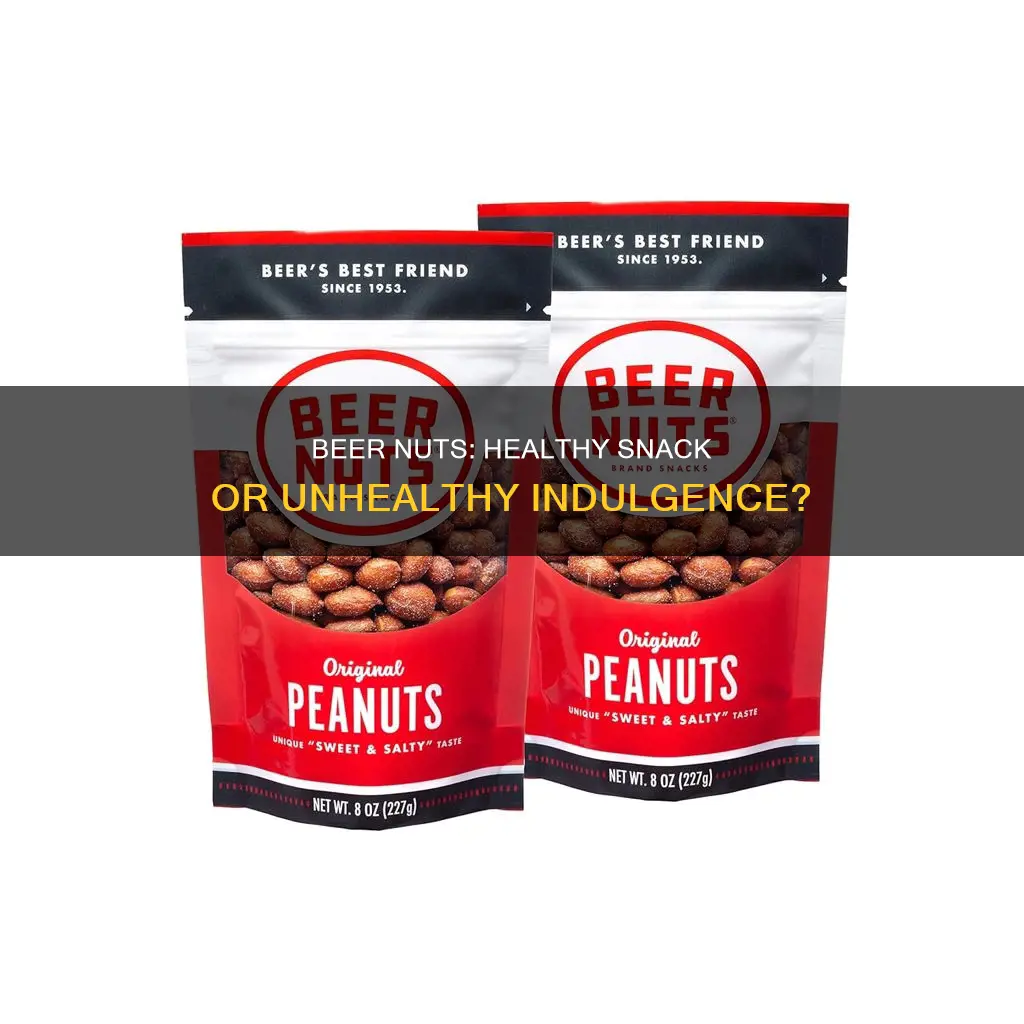
Beer nuts are a popular snack to have while drinking beer, but are they healthy? Beer nuts are typically made from peanuts that have been roasted and flavoured with salt or spices. While they are a good source of protein and fibre, they are also high in calories and fat. So, if you're watching your weight or trying to improve your heart health, it's best to consume beer nuts in moderation as part of a balanced diet. However, when paired with beer, the fat and fibre in nuts can slow down the absorption of alcohol, leading to potential health benefits.
| Characteristics | Values |
|---|---|
| Nutritional Value | High in fat, calories, protein, and fiber |
| Vitamins and Minerals | Good source of vitamins and minerals |
| Cholesterol | Boosts good (HDL) cholesterol and lowers bad (LDL) cholesterol |
| Alcohol Absorption | Fat and fiber in nuts slow down the absorption of alcohol |
| Taste | Salt in nuts balances out the bitter taste of hops in beer |
| Health Benefits | Can help with heart health and prevent hangovers |
What You'll Learn

Beer nuts are high in fat and calories
Beer nuts are a tasty snack, but they are also high in fat and calories. While nuts are a great source of protein and fibre, as well as vitamins and minerals, they are energy-dense foods. This means that they contain a lot of calories in a small volume of food.
A 28-gram serving of beer nuts contains 170 calories, 7 grams of protein, 14 grams of fat, and 190 milligrams of sodium. The high-calorie content is due to the high fat content, with just 1 ounce of beer nuts providing 2 grams of saturated fat. As a comparison, a serving of 50 grams of beer nuts contains 25 grams of fat and 300 milligrams of sodium.
While fat is an essential nutrient and a source of energy, it is also the most energy-dense macronutrient, providing 9 calories per gram. This is more than twice the amount of calories provided by carbohydrates and protein, which both provide 4 calories per gram. Therefore, it is important to be mindful of the amount of fat we consume, especially if weight management is a goal.
The type of fat is also important to consider. Beer nuts contain a 'good' type of fat, with a low amount of saturated fat. This is beneficial, as a diet high in saturated fat can lead to increased levels of 'bad' LDL cholesterol, which is a risk factor for heart disease. However, despite being a 'good' fat, consuming large amounts can still contribute to weight gain if eaten in excess.
In conclusion, beer nuts can be enjoyed as part of a balanced diet, but due to their high fat and calorie content, it is important to consume them in moderation.
Beer's Heart Health Benefits: Fact or Fiction?
You may want to see also

They're a good source of protein and fibre
Beer nuts are typically made from peanuts, which are roasted and flavoured with salt or spices. They are a good source of protein and fibre, as well as several important vitamins and minerals.
Peanuts are among the best sources of plant-based protein. They also contain a range of polyphenols, antioxidants, flavonoids, and amino acids, which are all beneficial to human health. Beer nuts also contain important vitamins and minerals, such as calcium, and are a good source of fibre.
The fibre in beer nuts can help you feel fuller for longer, and support muscle growth and repair. Fibre is also beneficial for heart health, as it helps to lower bad cholesterol, LDL, and boost good cholesterol, HDL. The fat in beer nuts also slows down the absorption of alcohol, which can be helpful if you've had one too many!
While beer nuts are a good source of protein and fibre, they are also high in calories and fat, so it's important to enjoy them in moderation as part of a balanced diet.
Beer and Diabetes: What's the Verdict?
You may want to see also

Beer nuts can be part of a healthy diet, in moderation
Beer nuts are typically made from peanuts that have been roasted and flavored with salt or spices. While they are not exactly known for being a health food, they can be part of a healthy diet when consumed in moderation. Here's why:
First, let's look at the nutritional value of beer nuts. Beer nuts are high in fat and sodium, with 1 ounce (28 grams) containing around 2 grams of saturated fat and 190 milligrams of sodium. They also provide 5 grams of carbohydrates. However, beer nuts also offer some nutritional benefits. They are a good source of protein and fiber, with 7 grams of protein and a decent amount of fiber per ounce. This can help increase feelings of fullness, support muscle growth, and promote digestive health.
Now, let's discuss how beer nuts can fit into a healthy diet. If your dietary goal is to lose weight or improve heart health, it is important to consume beer nuts in moderation. The high-calorie and fat content can contribute to weight gain if consumed in excess. However, when enjoyed in small servings and paired with other healthy foods, beer nuts can be part of a balanced diet. For example, you could have a small handful of beer nuts alongside fresh fruit or raw vegetables as a nutritious snack.
Additionally, nuts, in general, have been associated with several health benefits. They are known to boost good cholesterol (HDL) and lower bad cholesterol (LDL). This can have positive effects on heart health, especially when paired with the blood-thinning properties of alcohol. The fat and fiber in nuts also slow down the absorption of alcohol, which can help prevent hangovers.
In conclusion, while beer nuts may not be a health food, they can certainly be enjoyed as part of a healthy diet when consumed in moderation. The key is to practice portion control, balance them with other nutritious foods, and be mindful of your overall dietary goals. So, go ahead and indulge in a few beer nuts every now and then—just don't forget to pair them with a tasty adult beverage!
Beer and Health: Is NA Beer a Healthy Alternative?
You may want to see also

Nuts boost good cholesterol and lower bad cholesterol
Beer nuts are typically made from peanuts that have been roasted and flavored with salt or spices. While they are undeniably tasty, they are not exactly a health food. They are high in calories and fat, but they also contain protein and fiber, as well as several vitamins and minerals.
However, nuts, in general, have been shown to boost good cholesterol (HDL) and lower bad cholesterol (LDL). This effect depends on the type of nut, how it is prepared, and how much is consumed. For example, a 2004 study found that eating a handful of walnuts each day led to an increase in HDL cholesterol and a drop in LDL cholesterol. Similarly, a 2016 review found that eating almonds every day can lower LDL cholesterol while increasing or maintaining HDL cholesterol.
Peanuts, which are commonly used to make beer nuts, have also been shown to have cholesterol-lowering effects. A 2016 meta-analysis found that peanuts are rich in phytosterols, chemicals that may prevent the body from absorbing cholesterol. As a result, eating peanuts can lower total cholesterol and LDL cholesterol levels without significantly affecting HDL cholesterol levels.
In summary, while beer nuts may not be the healthiest snack option due to their high calorie and fat content, the nuts they contain can help boost good cholesterol and lower bad cholesterol. However, it is important to consume them in moderation and as part of a balanced diet to avoid weight gain and potential increases in LDL cholesterol.
Beer-Battered Fish: Healthy or Harmful?
You may want to see also

Salt in beer nuts balances out the bitter taste of hops in beer
Beer nuts are a popular snack to have while drinking beer, but they are also enjoyed on their own. They are typically made from peanuts that have been roasted and flavored with salt or a variety of spices. While they are undeniably tasty, they are not exactly a health food. Peanuts are relatively high in calories and fat. However, they do offer some nutritional benefits, such as being a good source of protein and fiber, as well as providing several important vitamins and minerals.
When it comes to the question of whether beer nuts are healthy, the answer depends on how you define "healthy." If you're trying to lose weight or improve your heart health, it's best to consume beer nuts in moderation. On the other hand, if you're looking for a tasty treat to enjoy in moderation, beer nuts can be part of a well-balanced diet. It's worth noting that while they provide some nutritional benefits, they are also high in calories and fat, so it's easy for the calories to stack up if you're snacking on them throughout the day.
Now, let's delve into the science behind why salt in beer nuts balances out the bitter taste of hops in beer. Hops, the flowers used in beer brewing, contribute to the bitter flavor of beer. The bitterness comes from the alpha acids or humolones present in hops. When you eat salty peanuts or other salted snacks with your beer, the sodium ions from the salt block the bitter alpha acids in the hops from binding to surface receptors on your tongue, preventing the transmission of a bitter taste signal to your brain. This is because salt molecules are small enough to fit into part of the bitter surface receptor, effectively blocking the bitter taste.
The pairing of beer and nuts is not just a matter of taste but also has some health benefits. Nuts are known to boost good cholesterol (HDL) and lower bad cholesterol (LDL). Additionally, the blood-thinning properties of alcohol and the natural fats in nuts can positively impact heart health. Furthermore, Swedish researchers have found that the fat and fiber in nuts slow down alcohol absorption, which can be beneficial if you've had one too many drinks.
Hard Cider vs Beer: Which Is Healthier?
You may want to see also
Frequently asked questions
Beer nuts are not the healthiest snack option. They are high in fat and sodium, but they also contain some protein and fibre, which can help you feel full for longer. Beer nuts can be enjoyed in moderation as part of a balanced diet.
Yes, beer nuts are relatively high in calories, with 1 ounce (28 grams) containing around 170 calories.
Yes, beer nuts can be a good source of protein, with 1 ounce containing approximately 7 grams of protein.
Nuts boost good cholesterol (HDL) and lower bad cholesterol (LDL). When paired with the blood-thinning properties of alcohol, this combination can support heart health. Additionally, the fat and fibre in nuts slow down the absorption of alcohol, helping to prevent hangovers.







